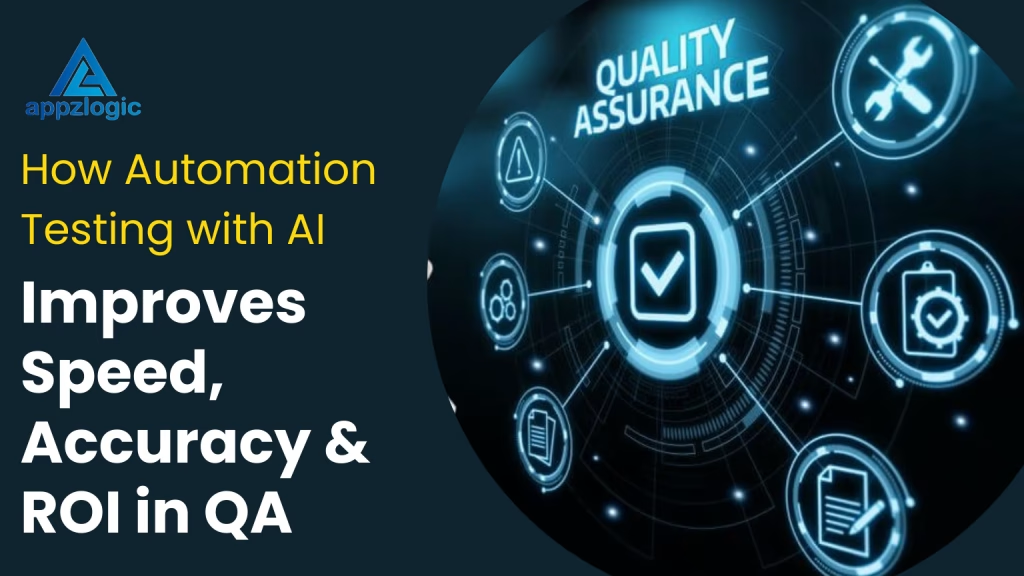
How Automation Testing with AI Improves Speed, Accuracy & ROI in QA
Quality assurance (QA) needs to be done fast, smarter, and more cost-effective. Traditional manual testing methods fail to keep up with the speed of Agile and DevOps pipelines. AI-powered test automation is changing the game when it comes to software testing. It is genuinely transforming how testing gets done. By speeding up the process, cutting down on human errors, and expanding test coverage, AI is making testing smarter and more efficient and adopting this shift is not just a nice-to-have but important for every business that wants to stay ahead in the market.
The Rise of AI in Test Automation
As applications grow in complexity and data volumes surge, QA teams face mounting pressure to deliver flawless products faster. AI automation testing significantly speeds up the testing process by handling vast amounts of data and complex test environments with ease.AI brings faster and continuous testing, nearly total automation, and faster ROI. These benefits are propelling organizations to integrate AI-driven tools into their testing lifecycle to optimize performance and accelerate release cycles. According to Camunda By combining machine learning (ML), natural language processing (NLP), various algorithms and models, and other AI methods, you can enable systems to take on those traditional human tasks by guiding the individual doing the task or even automating the task altogether.
Why Traditional Testing Needs an Upgrade?
Manual testing, while still relevant in exploratory scenarios, is time-consuming, error-prone, and difficult to scale. Automated testing brought some relief, but even that has limitations when scripts require constant maintenance or fail to keep up with evolving software.This is where AI steps in. AI-driven automation is transforming software testing by learning from past test executions, adapting to code changes, and automatically optimizing test cases.
How AI Enhances Test Automation ?
Autonomous Testing Speeds Up the Testing Process and Improves Accuracy:
AI goes beyond just automating tasks, it learns and adapts over time as it follows the AI/ML. In autonomous testing, this means faster and more accurate results, as the system can make smart decisions about what to test, when to test, and how to do it. By analyzing test data and recognizing patterns, AI helps in automatically update and optimize test cases for better efficiency. Forrester found that companies that implemented AI-driven testing saw up to 50% faster time to market.
1. AI in Automation Testing is Faster at Identifying Errors and Root Causes
AI uses techniques like anomaly detection, pattern recognition, and predictive analytics to identify errors and their root causes faster than traditional methods. This capability helps teams address bugs earlier in the development cycle, reducing the cost and effort of late-stage defect resolution.
2. More Accurate and Comprehensive Testing Protocols
AI minimizes human errors and increases the consistency of test execution. With more accurate and comprehensive testing protocols, AI ensures higher-quality outputs. It measures user pattern, application logs, and previous defects to intelligently prioritize test cases.
3. Key Benefits of AI-Powered Automation Testing
- AI tools automatically detect changes in the codebase and select relevant test cases. This drastically reduces the time spent on regression testing and speeds up continuous integration and deployment (CI/CD) pipelines.
- Investing in AI not only saves time but also reduces resource costs and increases test reliability. AI-powered test automation maximizes ROI by delivering faster releases with fewer bugs, ultimately leading to improved user satisfaction and customer retention.
- By automating repetitive tasks and regression testing, test automation increases the efficiency of quality assurance teams. Testers can now focus on high-value activities like exploratory testing and UX evaluation.
- AI tools can generate critical tests, prioritize them based on risk assessment, and create optimized test suites. This targeted approach ensures critical functionality is tested first, enhancing product quality while saving time.
Usages of AI Testing
Image-Based Testing: AI helps in image-based testing, recognizing UI elements visually. This is particularly useful for responsive designs or cross-browser compatibility testing, where layout issues may not be captured by traditional automated tests.
AI Spidering: AI spidering refers to automatically navigating through an application to discover pages, forms, and potential failure points. This helps uncover hidden bugs without manual intervention.
Monitoring API Testing: AI can monitor API behavior, identify anomalies, and predict failures even before they occur. This proactive approach ensures API reliability across environments and integrations.
Determining Whether to Run a Test Script: AI uses impact analysis to determine whether a test script is still relevant. This avoids running unnecessary tests and keeps your test suite lean and focused.
Expanding the Role of QA Testers
AI is not replacing testers, it empowers them. By taking over mundane, repetitive tasks, AI enables testers to become strategists and analysts. They can focus on user experience, security testing, and risk-based assessments. Testers duty is one of the important aspects of any software, and there is no room for errors in the testing, for example- small errors in ETL processes can lead to incorrect reports and flawed strategies. ETL testers ensure that data integrity is maintained by keeping it clean and consistent throughout the entire pipeline.
1. Enhancing the Quality of Test Cases
With AI, test cases can be dynamically updated based on changes in the code or usage patterns. This leads to enhanced test case quality and greater relevance to real-world user behavior.
2. Improving Regression Testing
Regression testing is one of the most time-consuming activities in QA. AI makes it smarter by identifying which areas of the code are affected by changes and selectively running the relevant tests. This improves regression testing while reducing execution time.
Read about: ETL data validation practices for HBS
Achieving Better ROI with AI Test Automation
We try to break down how the return on investment of AI testing is achieved:
- Reduced manual effort leads to lower operational costs.
- A faster test cycle enables quicker releases and faster time-to-market.
- Intelligent test execution helps catch issues early, reducing defects after release. This leads to fewer customer complaints and lowers the cost of fixing bugs later.
- Increased team productivity allows reallocation of resources to strategic initiatives.
With AI capabilities growing every day we can expect future automation tools to become even more intelligent and autonomous. They will integrate deeper into development workflows, work across platforms seamlessly, and require minimal human intervention. Businesses that embrace automated testing and adopt AI test automation will be better positioned to innovate, scale, and meet market demands.
Conclusion:
AI is revolutionizing software test automation by delivering unmatched speed. It enables QA teams to adopt a proactive quality engineering approach. With AI-driven automation, testing becomes significantly faster and more accurate, as intelligent algorithms can quickly identify errors and pinpoint their root causes. This not only accelerates the entire QA process but also reduces human error and oversight. AI-powered virtual assistants help individuals and businesses manage tasks efficiently. They significantly enhance efficiency by automating routine activities such as organizing schedules, handling emails, and processing requests.
At Appzlogic we provide Automation Testing with AI which provide software to work smoothly as we are the top Software Testing Company located in India, US and Canada.
Contact Us today for your business solutions.
Frequently Asked Questions
By automating tasks, learning from data, and adapting test cases quickly.
No, it supports testers by handling repetitive tasks so they can focus on strategy.
Faster releases, fewer bugs, lower costs, and better productivity.
It targets only the changed code areas, saving time and effort.
AI auto-navigates apps to detect hidden bugs and test coverage gaps.





